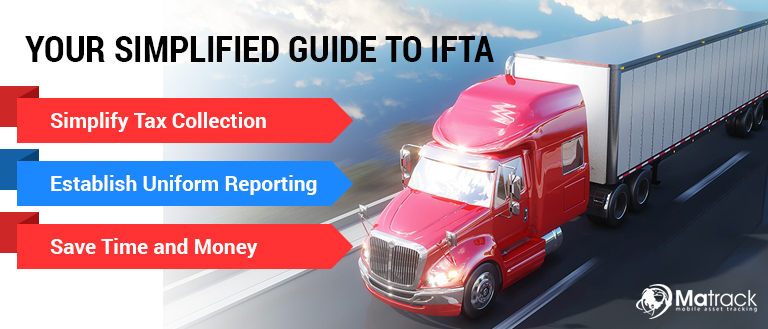Do you know if you fail to submit your IFTA auditing report on time, you may have to face fines up to $500?
As a fleet manager, you must know the importance of the different rules and regulations existing in the state. Whether it is IFTA, DoT, HoS, or others, you need to know and remain in compliance to stay in business.
Remembering and understanding all the rules and regulations of any law or agreement can be difficult. And as IFTA differs in each state, calculating tax, filing returns, and many other things need to be taken care of in a timely fashion to avoid fines. Moreover, it is very easy for newbie and seasoned drivers and fleet managers to get entangled in wordy laws. But no more! In this article, we will try to simplify IFTA and associated queries. Therefore stay with us till the end.
What is IFTA (International Fuel Tax Agreement)?
IFTA stands for International Fuel Tax Agreement. As the name suggests, IFTA is an agreement between the conterminous states of the United States and the provinces of Canada. This agreement aims to simplify the reporting of fuel usage by motor carriers traveling in more than one state.
Let us understand the International Fuel Tax Agreement in detail with the help of an example.
Suppose there is a motor carrier that works in more than one state. Since it frequently travels from one state to another, fuel purchases are made all over the states they travel. However, each state has its tax slab for fuel purchases. And this is where the problem of sharing the tax amount arises.
To give each state its fair share of fuel taxes, the government decided to make IFTA. After every three months, each motor carrier has to submit the documentation for the record of fuel purchased.
The government uses this report to disburse taxes fairly among all states. Moreover, it simplifies and makes one single fuel tax for truck operators operating in different territories.
Why do we need IFTA?
Now that we know what IFTA is? Let us see why IFTA was needed. To understand this, we have to go back to the 90s. Before IFTA, as the trucking industry expanded, each state started noticing that the trucks operating there were causing wear and tear to the highway. And therefore, they came up with a fuel tax system to collect taxes from such motor carriers.
Each truck operating there had to seek permission from a designated port of entry for fuel tax collection. Then the state arranged a special license plate named Bingo for them.
It was a cumbersome and time-consuming process. Moreover, soon truck drivers noticed that they were paying higher fuel rates in one state than in other states. It created a great disturbance among truck drivers and fleet operators.
There was a demand for replacing this old and confusing system. Therefore, the states decided to come together and sign a pact for one and uniform tax system throughout 48 US states and 10 Canadian provinces. Hence, in 1966, the IFTA came into existence and replaced the old tax system of 1945.
What are the main objectives of IFTA?
The main motto of the IFTA was to simplify the fuel tax collection process. After IFTA implementation, each motor carrier has to obtain a license from the department and submit a report quarterly to their home jurisdiction.
The main objective of the IFTA was as follows:
- To simplify the tax collection process by each state
- Establish uniform reporting requirements
- To save time and money for trucking business
- To disburse tax among different states fairly.
Jurisdictions Falling Under IFTA Scope
As stated above, around 48 states of the United States and ten provinces of Canada follow IFTA rules. Here is the name of them:
USA
| Alabama | Georgia | Maine |
| Arizona | Idaho | Maryland |
| Arkansas | Illinois | Massachusetts |
| California | Indiana | Michigan |
| Colorado | Iowa | Minnesota |
| Connecticut | Kansas | Montana |
| Delaware | Kentucky | Nebraska |
| Florida | Louisiana | Nevada |
| New Hampshire | Oregon | Vermont |
| New Jersey | Pennsylvania | Virginia |
| New Mexico | Rhode Island | Washington |
| New York | South Carolina | West Virginia |
| North Carolina | South Dakota | Wisconsin |
| North Dakota | Tennessee | Wyoming |
| Ohio | Texas | Mississippi |
| Oklaho | Utah | Missouri |
Canada
| Alberta | Nova Scotia |
| British Columbia | Ontario |
| Manitoba | Prince Edward Island |
| New Brunswick | Quebec |
| Newfoundland | Saskatchewan |
How Does IFTA Tax Work?
Do you find IFTA complicated? Well, let us simplify it even more with the help of an example.
Suppose a truck driver travels through different states for business. They will go to their state IFTA department and apply for the license. With the permit, they will get two fuel stickers to put on each side of the truck.
As they go to another authority, they keep track of fuel consumed and distance covered. After returning to the home state, they will have to file the IFTA report in three months.
Their state IFTA (International Fuel Tax Agreement) department will review the report and distribute the taxes accordingly to each state. Each state will receive its share per the miles driven in that.
If the tax collected is more than the required, similar to income tax, the fleet operators will receive the excess amount.
Note: What if the truck didn’t travel across the states? If you have applied IFTA stickers on your vehicle, you will have to submit the quarterly reports. Otherwise, you should notify the department.
Benefits Of IFTA Fuel Tax
Below are a few benefits of IFTA:
- IFTA allows states and some Canadian provinces to get their fair share of the fuel taxes. The drivers have to report their home state, which is in charge of jurisdiction according to the driver’s information. It is a time-saving process and removes roadblocks between states in tax distribution.
- IFTA taxes are used to develop infrastructure that helps truckers distribute goods nationwide with ease. It has to improve the highway condition and prevent road accidents.
- Another significant benefit of filing IFTA is uniformity and accountability. IFTA ensures that commercial motor vehicle drivers meet the specific qualifications and are accountable.
- IFTA taxes are a great way for fleet managers to look at the fuel price of different states. It helps them manage routes efficiently and decide where to fill their truck for getting the best fuel price.
Qualifications For IFTA: Whether You Fall Under IFTA Compliance
Before you get into all this, you should know if you are qualified for the IFTA registration. You have to submit the IFTA report if your commercial vehicle:
- Has three or more axles
- Or, have two axles and a gross weight exceeding 26,000 pounds
- Or, uses in combination that has GVM of more than 26,000 pounds
You only need to check these qualifications if your vehicle travels in more than one jurisdiction.
International Fuel Tax Agreement Exemptions
There are some exemptions to the IFTA rule. You need to check them too to see if you fall in this category or not. Here are some exemptions:
- Recreational vehicles
- Farm plated vehicles
- School buses
- Tow truck
- Government-owned vehicles
- Biodiesel vehicle
Non-IFTA Jurisdiction
If you reside in the following state, you won’t have to worry about IFTA.
United States
- Alaska
- Hawaii
- District of Columbia
Canada
- Yukon Territory
- Northwest Territory
- Nunavut
How To Apply For IFTA?
If you are new to the trucking business and want to know the process for applying for IFTA, here are some simple steps:
- First of all, you need to fill out the basic application form. You can take this application form from your state IFTA department.
- Basic details are registered business name, mail address, federal business number, and USDOT number. You can submit the form via mail or fax.
- After successful submission, the IFTA authority will issue official IFTA decals and your license.
How To File IFTA Online?
Filing IFTA tax is one of the important duties of the fleet manager. But it is a time-consuming process. Luckily now you can file online, save your precious time and use it for revenue-generating activity.
IFTA online filing is a free service that allows you to file your IFTA returns using the internet. It is a fast, easy, convenient, and accurate method. Even you won’t have to leave your office to file it. The only thing that you need is a computer and a reliable internet connection.
However, there are a few exceptions that you need to keep in mind while filing your IFTA quarterly tax return online- Late & amended returns or those returns that include gasoline volume are not filed online.
There are several advantages to filing your tags information online. Some of them are listed below:
- You will not have to fill out any paper tax form and can complete the processes online.
- It allows you to file the tax report flexibly and on your time.
- It is a fast process.
- You will also receive an instant acknowledgment from the state tax department and fee administration.
Step By Step Guide To File IFTA Returns Online
Are you ready to file your quarterly IFTA tax returns online? Well, follow these simple steps. But before we start, you have to keep your fuel receipts and ELD information handy, so that the overall process would not take more than an hour every three months.
- First, put the details of the fuel receipts in the Excel spreadsheet. It will help you calculate the gallons needed for the IFTA and also get an overall look at which state has the lowest fuel prices. It will help you to plan your route accordingly.
- Now add the details of the miles driven through these three months. It will be easier to file the IFTA tax return.
- Once you have gathered all the necessary data, go to the state website for the tax return.
- Now make sure that you are registered on the website.
- If not, you can register or simply log in using your username and password.
- Now look for the IFTA return tab. Here, select the fuel type, and add the total distance covered and fuel consumed. The system will automatically calculate the MPG. You can check if it matches what you have calculated or not. If not, you will have to go through your records once again.
- Fill out the significant details on the jurisdiction report by going over it now. Only the colored sections need to be filled out; the system will calculate the values for the others.
- After you are done filing jurisdiction reports, you will move to the next page. It will show the total miles and gallons you have entered at the beginning and the information entered in the system. Make sure it matches, or go back to edit it.
- Now to the next page that will show how much you are, how much refund you will receive. Remember, this is the last stage that allows you to go back to edit anything you left.
- After you hit the submit button, the form would be submitted. And you would not be able to get back to make any edits.
- Now you can see the official confirmation of your IFTA tax returns. You can go ahead to make payments and also print them.
How Often Do You Need to Submit The IFTA Report?
Motor carriers have to submit IFTA reports quarterly. Here are the due dates:
| IFTA Reporting Periods | Due Dates |
| 1st Quarter- January to March | 30 April |
| 2nd Quarter- April to June | 31 July |
| 3rd Quarter- July to September | 31 October |
| 4th Quarter- October to December | 31 January |
How To Calculate IFTA Fuel Tax Reports?
Before you submit your IFTA tax report, you need to do a few calculations. But don’t worry, we have simplified the whole process into some simple steps:
Calculating Miles Driven
First of all, you have to keep an accurate record of the amount of fuel consumed throughout the journey. Remember, you need to be accurate. For this, you can take the help of modern fleet management solutions.
Fuel Purchased
After determining the amount of fuel consumption, you need to collect the receipts and calculate the total gallons of fuel purchased.
You must rely on the original receipts and invoices.
Fuel Mileage
Before submitting an IFTA report, motor carriers must calculate the number of miles driven and fuel purchased. After this, you should start by calculating the overall fuel mileage.
You can calculate fuel mileage using this formula:
{Fuel Mileage= Total miles driven÷ Total gallons}
Next, you divide the fuel mileage by fuel consumed in different states.
For instance,
Total fuel consumed in Texas= Total miles driven in Texas ÷ Overall fuel mileage
Submission
Lastly, after this, you should put all the information together. And then, you can file the report to the respective department.
Important Things To Remember
Here is some important information you need to collect:
- Miles drove in each state
- The odometer reading at each state line
- Total gallons of fuel purchased in a different jurisdiction
- Original fuel receipts and invoices
- Individual trip reports
Consequences of Failing to Submit IFTA Reports
If you fail to submit your IFTA audit on time, you will be subject to a heavy fine. You will have to face a penalty of around $50.00 or 10% of the tax.
Streamline IFTA Reporting With Modern Technology
Traditionally, fleet managers and drivers used to fill the IFTA taxes manually. Right from tracking distance covered by the vehicle to fuel purchased. It is a tiring and time-consuming process. Moreover, humans tend to make errors. The mistake may seem small but can negatively affect your tax report.
You can save time and avoid any possible error by employing modern-day fleet management solutions and cloud-based reporting tools. With some simple inputs, you can generate IFTA reports.
How Can Matrack Simplify Your IFTA Fuel Tax Reports?
Matrack is known for its affordable and customized telematics solutions. It offers user-centric and comprehensive fleet management solutions. You can rely on this solution as it is easy to use and accurate.
By paying a nominal amount of $7, you can access different aspects of fleet management such as GPS tracker, electronic logging device, weigh station bypass, trailer and asset tracking, and more.
Moreover, no contract, free activation & cancellation, and excellent customer service are the best part of this user-centric system.
For more information and details, visit the website now and talk to our experts.
Common FAQs Related To IFTA
Do you still have some questions? If yes, then here are answers to some common FAQs.
Q1. What is IFTA Jurisdiction?
Jurisdictions falling under IFTA are known as IFTA jurisdiction. As stated above, around 48 states of the US and ten provinces of Canada fall under IFTA jurisdiction.
Q2. I live in Hawaii. Do I need to submit an IFTA report?
No, if you are a resident of Hawaii, Alaska, or the District of Columbia, you won’t need to submit IFTA reports.
Q3. Do I need to submit IFTA reports if I travel to a different state once in a while?
Even if you travel to other states once in a while, you have to register yourself with the IFTA department.
Q4. What is the penalty for late submission?
You will have to face heavy fines of around $50 or 10% of the total due.
Q5. What documents are required while filing quarterly tax reports?
Every fleet operator should submit fuel receipts, trip report records, IFTA licenses, and decal numbers.
Q6. How often do you have to renew the license?
Ans. You have to renew your IFTA license yearly. You can do this by visiting the nearest state IFTA department.
Q7. What if I suddenly need to travel to a different state?
Ans. You can register yourself for a temporary IFTA license.
Q8. What will happen if someone continuously submits an IFTA report late?
Ans. If you continuously fail to submit an IFTA report, the authority can cancel your IFTA permit.
In A Nutshell
To stay in compliance with different rules, fleet owners tend to rely on fleet managers. Hence, it becomes your responsibility to know regulations and ensure compliance. Moreover, with better knowledge and deep understanding, you can make better and informed decisions.
For more such articles and to know more about Matrack solutions, visit the website now. Moreover, do share your thoughts in the comment section below.



